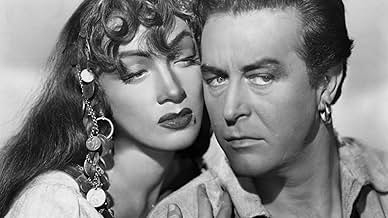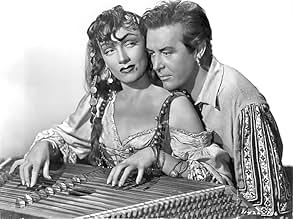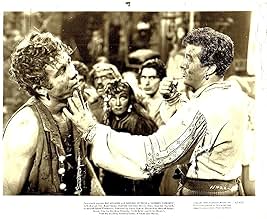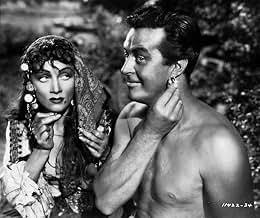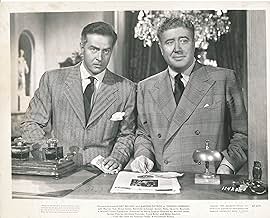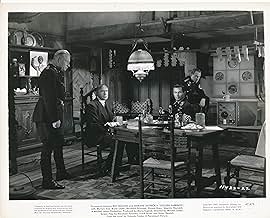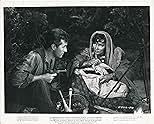IMDb RATING
6.6/10
1.3K
YOUR RATING
On the eve of WW2, a British spy goes to Germany to obtain a secret poison-gas formula from a scientist but things go awry and he is saved by a beautiful nomadic gypsy woman.On the eve of WW2, a British spy goes to Germany to obtain a secret poison-gas formula from a scientist but things go awry and he is saved by a beautiful nomadic gypsy woman.On the eve of WW2, a British spy goes to Germany to obtain a secret poison-gas formula from a scientist but things go awry and he is saved by a beautiful nomadic gypsy woman.
Harry Anderson
- German Farmer
- (uncredited)
Gordon Arnold
- Gypsy Boy
- (uncredited)
Ellen Baer
- Gypsy Girl
- (uncredited)
Martha Bamattre
- Wise Old Woman at the Krosigk's
- (uncredited)
Charles Bates
- Gypsy Boy with Information
- (uncredited)
Carmen Beretta
- Tourist
- (uncredited)
Louise Colombet
- Flower Woman
- (uncredited)
Robert Cory
- Burlington Club Doorman
- (uncredited)
Gwen Davies
- Stewardess
- (uncredited)
Featured reviews
Marlene Dietrich plays an European Gypsy woman in Pre-World War II Europe. Ray Milland played the British officer Denistoun who is on a mission. Ray Milland and Marlene Dietrich are excellent, entertaining, and enjoyable in the film. The story is fine and could have used more work but the Milland's British gentleman turned Gypsy in order to escape the Nazis does a fantastic job. It's interesting to see a character like Denistoun to transform into a Gypsy. The ending is worth watching the film. The film doesn't address the Nazi war crimes. European Gypsies were also targeted and persecuted by the Nazis during World War II. Still, this film is entertaining to watch and suspenseful. The cast is first rate in the Hollywood studio system factory where films were made faster even with mediocre scripts. Still, this film is one of my favorites with Marlene Dietrich.
This film is exceptional in that Marlene & Raymond present outstanding performances. The acting in this film is the greatest strength of the production, but the script, direction, and editing deserve applause. There is an extraordinary chemistry that exsists between the two stars. If you like Marlene, and you like Raymond, you'll love this film..... (It's a classic that compares with Casablanca.)
Marlene Dietrich play a Gypsy who helps British spy (Ray Milland) during World War II. They try to stop the Nazis from using poisonous gases for war use. They get romantically involved with each other while there on the mission. A nice entertaining movie to watch.
Those reviewers who have complained that this movie lacks plausibility or has problems of construction are missing the point. This is a wonderfully camp romance, with plenty of Play, gypsies! Dance, gypsies! music, that both sends up exotic love stories and celebrates them. Buttoned-up Ray Milland makes an amusing foil for a Dietrich with black hair, tattered scarves, and tons of jewelry. The character's eagerness to feed Milland and look after him more closely resembles the good German hausfrau Dietrich was off the set than her mannered vamp roles. Censorship being in force, it's made clear that they share a caravan on platonic terms only, with Milland fighting off Dietrich's advances with a determination remarkable for a heterosexual bachelor who might be killed any day. His only excuse is that she smells, so perhaps a stuffy, fastidious Englishman might indeed be put off.
In the small role of Milland's young companion on his secret mission, Bruce Lester adds a note of camp of a different kind. We are told at the beginning that he hero-worships Milland, and indeed he rather fawns on him. When, after they are separated, he meets Milland, now transformed into a brown-skinned gypsy with a shirt open to the waist, his glowing appreciation of the disguise even further suggests that not only Dietrich is romantically infatuated with Milland.
Despite the wonderfully improbable characters and sequence of events, the growing love of Milland for Dietrich and his acceptance of the non-rational aspects of life is rather touching. And when, on their last night alone before he escapes, he says that each of them now contain half of the other, the two have become one, and then darkness falls, I think we can assume that the censor decided to give them a break! One goof--at the beginning, Milland, who is supposed to be English, refers to a lieutenant, using the American pronunciation. (The English say "leftenant.") Since Milland was British, he must have been saying it that way because the American movie-makers feared that American audiences would be distracted and confused by the British style.
In the small role of Milland's young companion on his secret mission, Bruce Lester adds a note of camp of a different kind. We are told at the beginning that he hero-worships Milland, and indeed he rather fawns on him. When, after they are separated, he meets Milland, now transformed into a brown-skinned gypsy with a shirt open to the waist, his glowing appreciation of the disguise even further suggests that not only Dietrich is romantically infatuated with Milland.
Despite the wonderfully improbable characters and sequence of events, the growing love of Milland for Dietrich and his acceptance of the non-rational aspects of life is rather touching. And when, on their last night alone before he escapes, he says that each of them now contain half of the other, the two have become one, and then darkness falls, I think we can assume that the censor decided to give them a break! One goof--at the beginning, Milland, who is supposed to be English, refers to a lieutenant, using the American pronunciation. (The English say "leftenant.") Since Milland was British, he must have been saying it that way because the American movie-makers feared that American audiences would be distracted and confused by the British style.
Both Ray Milland and especially Marlene Dietrich had given great performances more than once and starred in a number of good to outstanding films, that both stretched them and played to their strengths (consider both important when it comes to acting). While not one of the all-time greats when it comes to directors, Mitchell Leisen in my mind was deserving of far more credit. The story for 'Golden Earrings' also sounded intriguing, so the promise was hardly non-existent let alone small.
'Golden Earrings' happened to be something of a comeback for Dietrich, entertaining the troops during the war meant an absence from the screen. While she doesn't fare badly at all here, she was deserving of a better comeback, in terms of overall quality for the film itself, than this. There have been far better representations of Milland as well. 'Golden Earrings' didn't strike me as an awful film, it is better than said though do agree with the criticisms against it. Great too it is a long way from being, didn't think overall it was particularly good.
Dietrich is 'Golden Earrings' biggest merit, she clearly has fun here and is immensely charming. It is hard to believe that she was absent from the screen at all, it was like she never left. Leisen also does a good job with the director, it is stylish and clever with touches of necessary subtlety. Some of the supporting cast do their best in unsubtle caricatured roles, especially Murvyn Vye.
Visually, 'Golden Earrings' is good looking, with slick photography and designed handsomely and evocatively. The music is both fun and dramatic, if at times obviously utilised. The title song is a memorable one, very haunting. Some funny moments and some poignant ones.
However, the script is a bit of a mess tonally, with a mix of comedy and drama, and in a way that jars at times. The comedy falls on the wrong side of camp, am aware that campness was the intent and was expecting it to be part of its charm but it was done to overkill effect here to the point of exhaustion. Although the poignant moments are there, too often the more dramatic elements veer on the melodramatic. Any suspense is not there enough, and the too often ponderous pace and overlong length are relatively big offenders as to why.
The story gets ridiculous frequently and has the same problems as the script, while the characters never feel real, with the supporting characters being caricatures. Other supporting cast members are bizarre and camp it up to extremes, particularly Bruce Lester. Milland's performance is inconsistent, at times too heavy-weight and at other times too low-key. His chemistry, what little there is of it (hardly any), is never harmonious and reminiscent of a meal with flavours that clash too much with each other. Apparently they didn't get along when filming and it shows.
In summary, watchable but strange. Doesn't turn to gold. 5/10
'Golden Earrings' happened to be something of a comeback for Dietrich, entertaining the troops during the war meant an absence from the screen. While she doesn't fare badly at all here, she was deserving of a better comeback, in terms of overall quality for the film itself, than this. There have been far better representations of Milland as well. 'Golden Earrings' didn't strike me as an awful film, it is better than said though do agree with the criticisms against it. Great too it is a long way from being, didn't think overall it was particularly good.
Dietrich is 'Golden Earrings' biggest merit, she clearly has fun here and is immensely charming. It is hard to believe that she was absent from the screen at all, it was like she never left. Leisen also does a good job with the director, it is stylish and clever with touches of necessary subtlety. Some of the supporting cast do their best in unsubtle caricatured roles, especially Murvyn Vye.
Visually, 'Golden Earrings' is good looking, with slick photography and designed handsomely and evocatively. The music is both fun and dramatic, if at times obviously utilised. The title song is a memorable one, very haunting. Some funny moments and some poignant ones.
However, the script is a bit of a mess tonally, with a mix of comedy and drama, and in a way that jars at times. The comedy falls on the wrong side of camp, am aware that campness was the intent and was expecting it to be part of its charm but it was done to overkill effect here to the point of exhaustion. Although the poignant moments are there, too often the more dramatic elements veer on the melodramatic. Any suspense is not there enough, and the too often ponderous pace and overlong length are relatively big offenders as to why.
The story gets ridiculous frequently and has the same problems as the script, while the characters never feel real, with the supporting characters being caricatures. Other supporting cast members are bizarre and camp it up to extremes, particularly Bruce Lester. Milland's performance is inconsistent, at times too heavy-weight and at other times too low-key. His chemistry, what little there is of it (hardly any), is never harmonious and reminiscent of a meal with flavours that clash too much with each other. Apparently they didn't get along when filming and it shows.
In summary, watchable but strange. Doesn't turn to gold. 5/10
Did you know
- TriviaIn the scene with Lydia and the stew pot, dry ice was used to give the impression of vapors and heat. However, a small fire was lit under it, and when filming resumed, between takes Marlene Dietrich assumed there was no real heat and suffered second-degree burns to her hand. She refused to hold up production and instead kept dipping her hand in the pot that had been refilled with ice water.
- GoofsIn the climax where Lydia is escaping though the wilderness from the Nazis, in some shots she is seen wearing high heels and at other times appears in bare feet.
- ConnectionsFeatured in Hollywood Mavericks (1990)
- SoundtracksGolden Earrings
Music by Victor Young
Lyrics by Jay Livingston and Ray Evans
Sung by Murvyn Vye (uncredited)
- How long is Golden Earrings?Powered by Alexa
Details
Box office
- Budget
- $1,000,000 (estimated)
- Runtime1 hour 35 minutes
- Color
- Aspect ratio
- 1.37 : 1
Contribute to this page
Suggest an edit or add missing content


